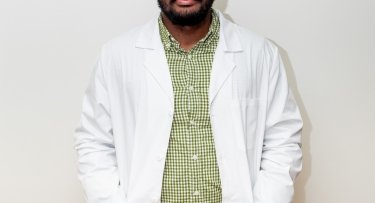Mercy College Clinical Laboratory Science Program Prepares Students for High-Demand Jobs

The Mercy College Clinical Laboratory Science Program prepares students to become highly skilled licensed clinical laboratory technologists. This in-demand degree provides career opportunities in hospitals, biotechnology companies, labs, pharmaceutical companies, higher education and laboratory informatics.
Individuals in this field have been leading the way during the COVID-19 pandemic with many laboratory technologists conducting cutting-edge research to test for evidence of the virus that causes COVID-19, as demonstrated by Mercy alumnus Edson Jules ’15, M.B.A ’16.
After graduating in 2015 with his bachelor’s degree in biology, Jules landed a job in the nephrology lab at New York Medical College in Valhalla. By the time the pandemic hit, he was out of work and living in New Rochelle, the COVID-19 epicenter in New York. “Everyone around me was so afraid of getting the virus, and I wanted to help,” he said. “I knew my background in molecular PCR testing would be valuable in a lab.” He accepted a position at BioReference Laboratories in New Jersey, where he began working the night shift to help relieve the backlog of testing.
Jules took to the work right away. “In the lab, people work together to help patients get treated faster, preventing more deaths,” he said. Yet to work in New York State, or to expand his expertise to include all areas of the lab, he needed to be licensed. That’s when he decided to return to Mercy for his second bachelor’s degree, this time in clinical laboratory science. “Not a lot of people know about the field, but it’s important because it helps doctors narrow down the causes of an illness so they can treat it,” he said. “It’s the reason I went back to school.”
After he graduates next August, Jules will be qualified to work in medical and diagnostic laboratories closer to home. It will also widen his experience to include more specialized fields. “There are lots of opportunities,” he said. “I’m keeping my options open.”
Michelle Naylor, assistant professor and program director of the Mercy College Clinical Laboratory Science Program, sees the growth and importance of this degree. “Labs require a great deal of oversight and are regulated by many different entities,” she said. “To be well-suited for this profession, you have to work with those rules and make sure your area of the lab is in compliance. You’re dealing with patients’ lives, and you don’t want to make mistakes.”
To learn more about the Mercy College Clinical Laboratory Science Program, please click here.
